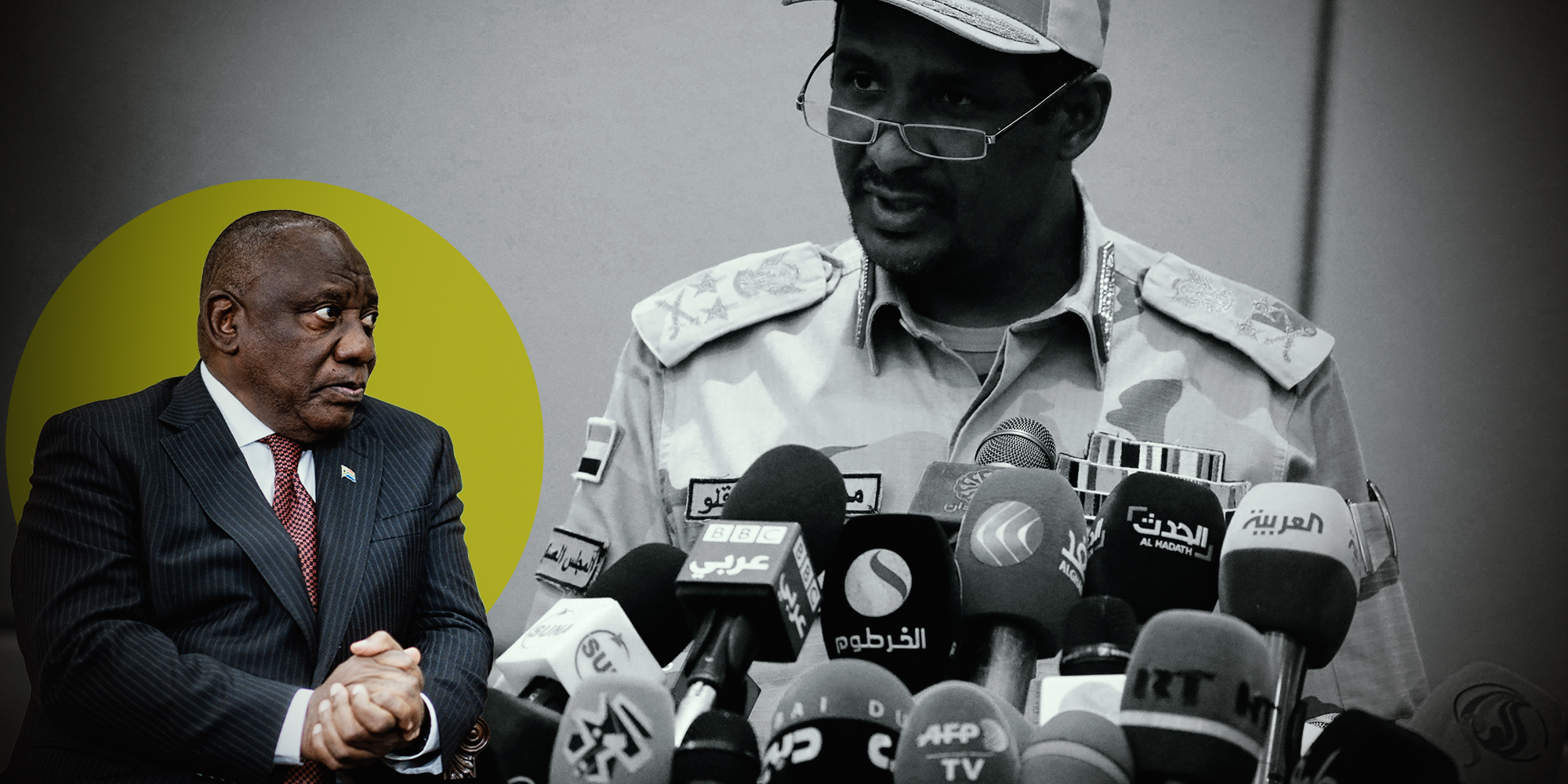On 4 January, President Cyril Ramaphosa hosted the leader of the Rapid Support Forces (RSF) of Sudan, General Mohamed Dagalo, aka Hemedti, at his official residence in Pretoria.
It was smiles and giggles all around as the two posed for photographers. In an official statement after the meeting, Ramaphosa “welcomed” the briefing by Dagalo and said he supported “immediate face-to-face dialogue” to solve the Sudanese civil war.
/file/dailymaverick/wp-content/uploads/2024/01/MillsPicture-1.png)
It was an extraordinary meeting with a man who is behind some of Africa’s most grotesque war crimes. Before seizing power in a coup, Dagalo had been chosen by the then Sudanese president, Omar al-Bashir, to lead the RSF, which was sent to gain control of rebel-held areas in the Darfur region of Sudan.
What followed was a string of brutal war crimes and crimes against humanity. According to a Human Rights Watch report titled Men With No Mercy based on interviews with 151 survivors who fled Sudan:
“The RSF committed a wide range of horrific abuses, including the forced displacement of entire communities; the destruction of wells, food stores and other infrastructure necessary for sustaining life in a harsh desert environment; and the plunder of the collective wealth of families, such as livestock. Among the most egregious abuses against civilians were torture, extrajudicial killings and mass rapes.”
According to researcher Eric Reeves, about 600,000 are believed to have died in Sudan’s brutal pogroms.
You could come up with a valid, if somewhat tortured, explanation for why it was legitimate for Ramaphosa to meet Dagalo and to hold back on criticism of his warlord habits. It would go along these lines: South Africa has a pragmatic foreign policy which seeks to bring together implacable enemies, even those in bitter armed conflict with each other, in the interests of forging peace.
When South Africa was criticised for failing to support UN resolutions condemning the Russian invasion of Ukraine, the argument was made that it was more important to stay in contact with both sides so that peace talks could be encouraged than to condemn one side for its failure to adhere to international law.
That would at least suggest there was a semblance of coherent policy behind the government’s failure to speak out against aggressors.
If such an approach was indeed in place, it would dictate that, when it comes to the conflict between Israel and Palestine, South Africa would keep its powder dry and, staying in close contact with both sides, seek to coax the parties towards peace talks through “immediate face-to-face” dialogue, to quote Ramaphosa on the Sudanese conflict.
But exactly a week after Ramaphosa’s tea with the warlord, South Africa was at the International Court of Justice in The Hague, arguing a case of genocide against Israel. It turns out that South Africa has no guiding foreign policy. It has countries and leaders that it likes and those that it loathes.
This can be the only reason that it has taken a very different and openly confrontational approach with Israel.
Instead of tea, coaxing towards dialogue and assiduously finding and exploring common ground, South Africa withdrew its diplomats from Israel, passed a parliamentary resolution to expel Israel’s ambassador and took it to court for genocide.
In a statement issued with unusual speed, on 7 October, the government ignored the Hamas terror attack that had taken place on that day and instead talked about “the recent devastating escalation in the Israeli-Palestinian conflict”. The use of the word ‘recent’ was odd as the Hamas killings had occurred on that day. The statement anticipated Israel’s response by warning against heavy-handed reaction.
A shift to the authoritarian camp
Why does South Africa loathe Israel, despise the US, dislike “the West”, but tolerate Russia and Sudanese warlords? The answer lies in South Africa’s decision to abandon its “non-aligned” position and shift decisively from the democratic to the authoritarian camp as the world consolidates itself into increasingly hostile blocs.
Our new friends are the likes of Russia, China, Saudi Arabia, the UAE and Iran — the latter whom we have brought out of isolation with an invitation to join BRICS.
Arguing the case for South Africa’s Israeli exceptionalism in News24, South Africa’s director-general of international relations and cooperation, Zane Dangor, said South Africa was “duty-bound to prevent and punish acts of genocide”.
Apparently, Israel is the only country in the world that “duty-bound” South Africa has found to have fallen on the wrong side of international human rights law, and neither Sudan nor Iran where the Nobel laureate Narges Mohammadi languishes in jail while the regime’s proxies in Hamas and Hezbollah foment regional strife, nor China for its persecution of ethnic minorities, nor Venezuela, nor Uganda nor Vladimir Putin’s Russia.
When you add to this the country’s decision not to allow a Jewish captain of its Under-19 cricket team, you start to get the strong odour of anti-Semitism, a charge which the South African Jewish community has already aired.
Writing in the Jewish Report under the headline Is it time to go?, Howard Sackstein said:
“The clock ticked and stopped on 7 October 2023. The behaviour of the South African government was nothing short of betrayal. President Cyril Ramaphosa’s failure to condemn the 7 October massacre; his failure to reach out to the families of the two South Africans massacred in the Hamas genocide; his failure to act on the two South Africans kidnapped by Hamas; and his smirk blame of Israel for deserving the attack two weeks after the massacre, while wearing a Palestinian keffiyeh, will forever be a symbol of his Judas moment.”
Of course, the correct foreign policy approach for South Africa is to leverage its human rights record to promote democracy and the rule of law by speaking out firmly against breaches of international law, and also to use the example of the negotiated end of apartheid as leverage to help bring warring parties to peace talks.
Dangor said: “What we have not done, as so ridiculously alleged by some, is to take money from Iran or act on the behest of Iran or any other state.”
Tehran cannot believe its luck. It has a democracy wearing the somewhat frayed threads of Nelson Mandela’s halo completely on its side in the Israel conflict. If it is true that Iran is not paying for this bonanza, Dangor should sue them. DM
Greg Mills and Ray Hartley work for The Brenthurst Foundation.





 Illustrative image | President Cyril Ramaphosa; Leader of the Rapid Support Forces of Sudan General Mohamed Dagalo, aka Hemedti. (Photos: Pete Marovich for The New York Times | EPA-EFE / MARWAN ALI)
Illustrative image | President Cyril Ramaphosa; Leader of the Rapid Support Forces of Sudan General Mohamed Dagalo, aka Hemedti. (Photos: Pete Marovich for The New York Times | EPA-EFE / MARWAN ALI)